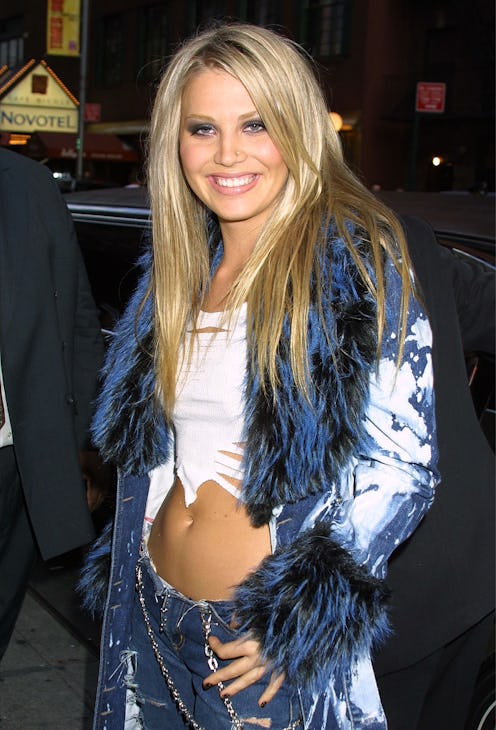Entertainment
Willa Ford Better Be Serious About This Comeback

Known primarily for timeless hit single "I Wanna Be Bad," Willa Ford was the singer who told us early 2000s teens it was OK to be different — and dare I say it — even a little bad. In a new interview with Billboard, Ford spoke about her time in the limelight and why her music meant so much to members of the LGBTQ community growing up in the late 90s and early 2000s. As a gay closeted teen who was — and still is — a fan of Ford, I can definitely attest to relating to Ford and her music. Heck, "I Wanna Be Bad" is still on a number of my favorite Spotify playlists.
In her first full interview in years, Ford teased the possibility of a comeback tour. And what type of venues is she interested in playing? The ones that would totally welcome her back with open arms — gay clubs. "I'd love to hit the gay club circuit because it would be so empowering and fun every night,” Ford told Billboard.
When I was a teenager, I was a loyal fan of Britney Spears. So much so that to this day I've never purchased a Christina Aguilera album. Sure, I know that there wasn't really a beef between them, and the rumors of one have long been put to rest, but I've been a loyal member of the Britney Army since 1999, and part of my self imposed rules of such meant not putting any other artist above Godney. Despite the fact that she threw a little shade at the Holy Spearit, there was something appealing about Ford to my teenage self — she wanted to be bad, and she didn't apologize about it.
The early 2000s were a strange time, where it seemed that female pop stars had to promote images of both chastity and sexuality. Artists like Spears and Jessica Simpson proclaimed virginity (not that it was anyone's business in the first place) while singing lyrics about sex and releasing provocative music videos. How much of this was pressure from the industry to try to ride the line between these two personas to appeal to different audiences is another story, but regardless of why it was happening, unlike Spears and Simpson, Ford didn't apologize for being provocative. Quite the opposite, in fact; Ford embraced it, and in doing so she became relatable to many gay teens in a different way than her peers. It was like she showed us that we didn't have to lie or feel ashamed of our desires, which is a powerful message to someone struggling with their sexual identity.
"Part of it was image-based," Ford told Billboard about her relationship with the LGBTQ community. "Britney Spears was really the first pop girl to launch, so you can't touch that: Britney is iconic. Then you had Christina Aguilera, Jessica Simpson and Mandy Moore. Everyone was doing this squeaky clean image, and I was 21 coming out on a record like, 'This is not me.'"
First of all, I'm glad to see that even Ford will now acknowledge that Spears is an icon. Second of all, I think she clearly understands why her first single meant so much to fans.
Ford continued,
"He [Jason Flom] got it that I was 21 and didn’t want to be a goody two shoes. He let me come out guns blazing and finding myself to be honest. I think what the community felt from that was an authenticity of 'I'm trying to figure out who I am,' and it's okay to say, at the time it sounds cheesy, but 'I wanna be bad.' It was okay at that time — we no longer had to keep the shutters on. We could come out and be like 'I want to go out one night, be this person and I don’t want anyone to tell me who I am.' I think that struck a chord with the [LGBTQ] community that maybe some music hadn’t yet. I think there was a message in that music."
Preach! There was definitely a message in "I Wanna Be Bad" that spoke to LGBTQ teens in a way no other song yet did. Remember, this was long before songs like Kesha's "We R Who We R" or "Firework" by Katy Perry.
It's a travesty that Ford's game changing music career was cut short, but there's still hope for those of us who remain fans of her music. "I have thought about coming back, and I know who my community was and who would embrace me," she told Billboard, referring to her LGBTQ fans. "When I look at Kylie Minogue, she did [her comeback] really right. She did Loco-Motion, she went away for 20 years — which is almost how long I’ve gone away — and then she comes back with this amazing dance-pop record. For me it was groundbreaking in the states."
Could Ford be following in the footsteps of Minogue, a fellow icon in the gay community? "I really do miss music," Ford said, "it's my first passion, my first love." I don't know about you, but I'd totally listen to new music from Ford, and I'd absolutely buy a ticket if she went on a club tour. Let's make this come back happen!